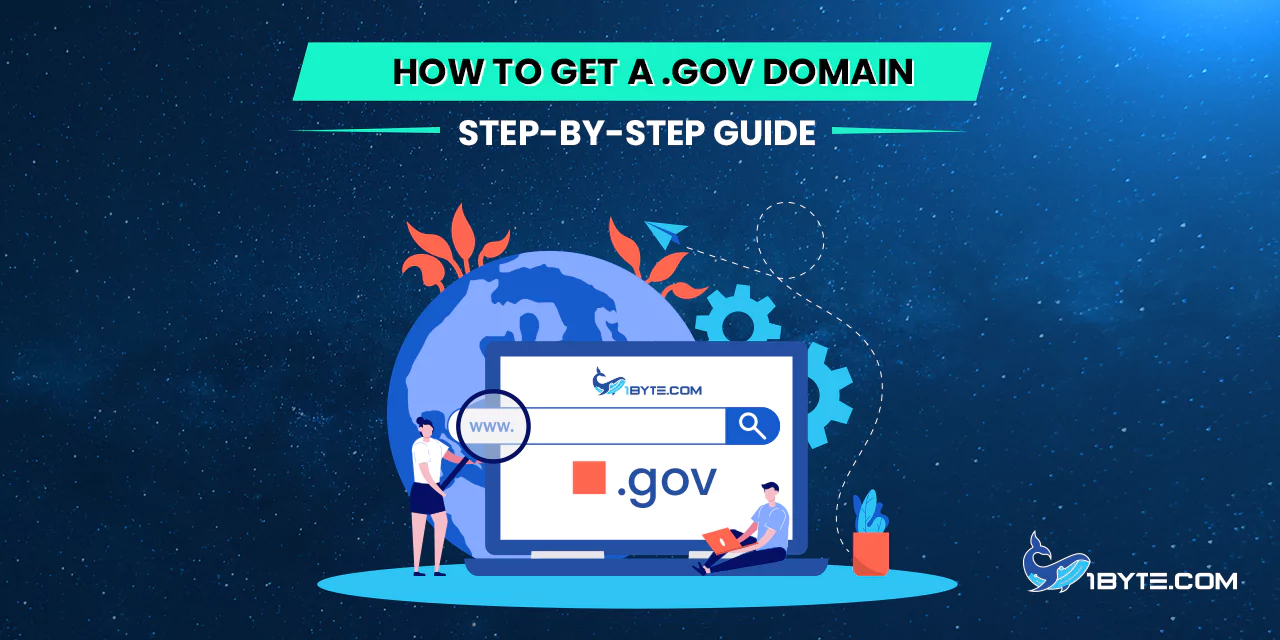In this comprehensive step-by-step guide, you will learn how to get a .gov domain for your government entity or official organization. Obtaining a .gov domain is crucial for establishing credibility and trust online. The process might seem daunting, but fear not – it’s actually quite straightforward. Let’s dive in and explore the eligibility criteria, application process, and essential tips for a successful registration. By the end of this article, you’ll be equipped with the knowledge and confidence to secure your very own .gov domain and showcase your authority on the web. So, let’s get started!
Eligibility Criteria for .gov Domains
To get a .gov domain in the top-level domain list, certain eligibility criteria must be met. These criteria are put in place to ensure that only legitimate government entities and official organizations can register and use .gov domains.
- Governmental Entities: The primary eligibility requirement is that the entity applying for a .gov domain must be a government agency at the federal, state, local, or tribal level. This includes departments, bureaus, councils, and other official bodies.
- Official Organizations: In some cases, non-governmental organizations (NGOs) that are affiliated with the government and provide essential services may also qualify for a .gov domain. These organizations must have a strong relationship with the government and be able to demonstrate their official status.
- Purpose and Use: The domain’s purpose must align with the mission and activities of the government entity or official organization. It should be used for official communication, providing information to the public, or delivering government-related services.
- Prohibited Uses: There are certain activities that are not allowed with .gov domains. These include engaging in commercial activities, endorsing political candidates, or promoting products or services unrelated to the entity’s official functions.
- Legal Compliance: Applicants must comply with all applicable laws and regulations regarding their eligibility for a .gov domain. Any misrepresentation or false information in the application can lead to rejection or revocation of the domain.
- Documentation: During the application process, applicants will need to provide specific documentation to prove their eligibility. This may include official government letters, registration certificates, or other supporting materials.
- Domain Name Selection: The domain name should reflect the government entity’s name or the official organization’s name accurately. It’s essential to choose a name that is relevant and represents the entity’s identity clearly.
Preparing for the Application
Before starting the application process for a .gov domain, thorough preparation is essential. Adequate preparation will help ensure a smooth and successful registration process.
- Gather Necessary Documents and Information: Begin by collecting all the required documentation and information for the application. This may include official government identification, certificates of incorporation, or other relevant paperwork.
- Compliance with Registration Policies: Familiarize yourself with the domain registration policies set by the registrar and the relevant domain authority. Ensure that your entity meets all the necessary requirements to avoid any potential roadblocks during the application process.
- Choose an Appropriate Domain Name: Selecting a suitable domain name is crucial. Opt for a name that aligns with your government entity or official organization’s name, making it easier for the public to identify your online presence.
- Review and Verify Information: Double-check all the gathered information and documentation for accuracy. Ensuring that all details are correct will prevent delays or rejections in the application process.
- Budget and Fees: Consider the cost associated with registering a .gov domain. While the domain itself is often free for eligible entities, there might be administrative or processing fees. Be prepared to cover these expenses.
- Timeline and Planning: Plan ahead and allocate enough time for the application process. The process may take several weeks, so starting early will help avoid last-minute rush or delays.
- Seek Professional Assistance: If needed, seek assistance from experts who are well-versed in the .gov domain registration process. Consulting with professionals can provide valuable insights and guidance throughout the application.
By taking these steps to prepare for the .gov domain application, you increase the likelihood of a successful registration. Being well-prepared demonstrates your commitment to maintaining a trustworthy and authoritative online presence as a government entity or official organization.
Application Process
The application process for getting a .gov domain involves several straightforward steps. Follow this easy-to-understand guide to successfully register your government entity or official organization:
1. Selecting a Registrar: Begin by choosing a reputable registrar authorized to process .gov domain registrations. Research different registrars and opt for one that meets your specific needs.
2. Creating an Account: Register an account with the chosen registrar. Provide the necessary details, including your entity’s name and contact information.

3. Completing the Application Form: Access the .gov domain application form on the registrar’s website. Fill in the required information accurately and completely.
4. Submitting Required Documentation: Upload the necessary documentation to verify your eligibility. Ensure all documents are in the correct format and up-to-date.
5. Review and Verification: Review the application thoroughly to avoid any mistakes. Once submitted, the registrar will verify your eligibility and documentation.
6. Potential Challenges: Be prepared for potential challenges during the verification process. Address any issues promptly and provide additional information if requested.
7. Waiting Period and Response Time: The verification process may take some time. Be patient and monitor your email for any communication from the registrar.
8. Domain Ownership: Upon approval, the registrar will assign ownership of the .gov domain to your entity. You can now use it for official purposes.
9. Domain Management and Renewal: Manage your .gov domain through the registrar’s control panel. Keep the domain information updated and renew it as required.
By following these steps, you can smoothly navigate the application process and secure your .gov domain. Remember to provide accurate information and stay compliant with the registration policies. Your .gov domain will soon be a symbol of trust and authenticity for your government entity or official organization.
Recommended reading: How to Setup Redirect Emails?
Verification and Approval
The verification and approval process to get a .gov domain is a crucial step in ensuring the legitimacy and authenticity of the registration. Follow this easy-to-understand guide to navigate this phase successfully:
1. Verification Procedures: After submitting your .gov domain application, the registrar will begin the verification process. They will carefully review the provided documentation to confirm your entity’s eligibility.
2. Thorough Evaluation: The registrar will evaluate your government entity or official organization’s information to ensure it aligns with the eligibility criteria for .gov domains.
3. Potential Challenges: During the verification process, certain challenges might arise, such as incomplete or inaccurate documentation. Address any issues promptly and provide additional information as needed.
4. Response Time: The time taken for verification can vary based on the registrar and the complexity of the application. Be patient and wait for communication from the registrar.
5. Approval Notification: Upon successful verification, you will receive a notification confirming the approval of your .gov domain registration. Congratulations! Your entity is now a proud owner of an authoritative .gov domain.
6. Rejection and Appeals: In some cases, if the verification process finds discrepancies or non-compliance, your application might be rejected. If this occurs, you may have the option to appeal the decision or make the necessary amendments for reapplication.
7. Domain Ownership: With the approval, ownership of the .gov domain is transferred to your entity. You can now proceed to manage and utilize the domain for official purposes.
By understanding the verification and approval process, you can ensure a smooth journey toward acquiring your .gov domain. Complying with the eligibility criteria and providing accurate documentation are key factors that will facilitate the successful registration of your government entity or official organization’s online presence.
Domain Management and Renewal
Once you have successfully acquired a .gov domain for your government entity or official organization, proper management and timely renewal are essential to maintain its credibility and functionality. Follow this easy-to-understand guide to effectively manage and renew your .gov domain:
1. Domain Control Panel: Upon domain approval, the registrar will provide access to a domain control panel. Use this panel to manage various aspects of your .gov domain.
2. Updating Domain Information: Keep the domain information accurate and up-to-date in the control panel. This includes contact details and administrative information.

3. Website Content: Regularly update the content on your .gov website to ensure it stays relevant and informative to the public.
4. Security Measures: Implement robust security measures to protect your .gov domain and website from potential threats. This helps maintain the trust of users and stakeholders.
5. Monitoring and Analytics: Use website analytics tools to monitor site traffic and user behavior. This data can guide improvements and adjustments to enhance user experience.
6. Domain Renewal Reminder: Set reminders for domain renewal dates well in advance to avoid unintended lapses. Missing the renewal deadline could lead to losing the domain.
7. Renewal Process: When the renewal date approaches, initiate the renewal process through the domain control panel or contact the registrar directly.
8. Timely Payment: Ensure timely payment of domain renewal fees to keep the .gov domain active. Late payments might incur additional charges or result in domain suspension.
9. Continuous Compliance: Stay informed about any changes in domain registration policies and ensure continuous compliance to maintain the domain’s eligibility.
Tips for a Successful .gov Domain Application
Securing a .gov domain is a significant step for any government entity or official organization. To ensure a successful application process and acquire this prestigious domain extension, follow these comprehensive tips.
Providing Accurate and Up-to-Date Information
One of the most critical factors in securing a .gov domain successfully is ensuring that all the information you provide in your application is accurate and up-to-date. To increase your chances of approval, follow these essential steps:
- To start, review your government entity or official organization’s official records to gather accurate and current information. Check for any changes in your entity’s name, contact details, or purpose that may need to be updated in the application.
- If the application requires supporting documentation, carefully validate the accuracy of these documents. Ensure that they reflect your entity’s current status and activities, as inconsistencies may lead to delays or rejection.
- Provide an active and valid email address and contact number. This way, the registrar can easily reach you for any updates or clarifications during the application process.
- Thoroughly proofread the application form and attached documents to eliminate any typos or errors. Even small mistakes can create misunderstandings or impact the registrar’s evaluation.
- Consistency is crucial. Ensure that the information in the application form matches the details in the supporting documents. This demonstrates your entity’s reliability and professionalism.
- Stay informed about any changes in your entity’s information that might impact the application. Update the application accordingly, if required, to maintain accuracy.
- If your government entity or official organization has an existing website, provide the current URL in the application. This helps the registrar verify your entity’s identity and purpose.
- Transparency and honesty are key. Provide accurate information, even if certain details might not be entirely favorable. Misrepresentations can lead to rejection and jeopardize the application.
Understand and comply with registration policies

A critical aspect of a successful .gov domain application is a clear understanding of the registration policies. Complying with these guidelines is essential to meet the eligibility requirements and gain approval for your government entity or official organization. Follow these simple yet crucial steps to ensure compliance:
- To begin, carefully read and comprehend the registration policies set forth by the registrar and the relevant domain authority. Understanding the requirements will help you align your application with the specified criteria.
- Pay special attention to the eligibility criteria for .gov domains. Ensure that your government entity or official organization meets all the necessary requirements before proceeding with the application.
- Check for any restrictions or prohibited uses of .gov domains. Make sure your entity’s activities align with the permitted usage, avoiding any violations during the registration process.
- If you have any uncertainties about the registration policies, seek clarification from the registrar or consult with experts experienced in .gov domain applications.
- Transparency is key when communicating with the registrar. Provide all necessary information truthfully and accurately, adhering to the specified guidelines.
- Stay up-to-date with any changes in the registration policies. Policies might evolve over time, and compliance with the latest requirements is crucial for a successful application.
Throughout the application process, keep in mind that understanding and compliance with the registration policies demonstrate your entity’s commitment to adhering to the rules and regulations. This not only increases the likelihood of approval but also establishes your government entity or official organization as a trustworthy and reliable online presence. By ensuring compliance, you reinforce your authority and credibility with the .gov domain, making it an invaluable asset for your online representation.
Seek professional assistance if needed
Navigating the .gov domain application process can be complex, especially for entities new to the process or facing unique challenges. In such cases, seeking professional assistance can be immensely beneficial. Here’s how you can make the most of this guidance:
- If you encounter challenges or uncertainties during the application process, don’t hesitate to seek help from experts experienced in .gov domain registrations. These professionals can provide valuable insights and guidance tailored to your entity’s specific needs.
- Professional assistance can ensure that your application meets all the necessary requirements, reducing the risk of errors or omissions that could lead to rejection.
- Consulting with experts can also save time and effort, as they understand the intricacies of the application process and can streamline your path to get the .gov domain.
- Ensure that the professionals you seek guidance from are reputable and knowledgeable in .gov domain registrations. Their expertise and understanding of the process will greatly contribute to a successful application.
- Be open and transparent when discussing your entity’s requirements with the experts. Provide all relevant information to enable them to provide accurate advice and support.
Remember that seeking professional assistance does not diminish your entity’s credibility. On the contrary, it reflects your commitment to ensuring a smooth and successful application for the .gov domain.
FURTHER READING: |
1.How To Host Any Domain With Free DNS On 1Byte Cloud Hosting |
2.9 Tips For How to Choose the Best Domain Name For Your Website |
Leverage 1Byte’s strong cloud computing expertise to boost your business in a big way
1Byte provides complete domain registration services that include dedicated support staff, educated customer care, reasonable costs, as well as a domain price search tool.
Elevate your online security with 1Byte's SSL Service. Unparalleled protection, seamless integration, and peace of mind for your digital journey.
No matter the cloud server package you pick, you can rely on 1Byte for dependability, privacy, security, and a stress-free experience that is essential for successful businesses.
Choosing us as your shared hosting provider allows you to get excellent value for your money while enjoying the same level of quality and functionality as more expensive options.
Through highly flexible programs, 1Byte's cutting-edge cloud hosting gives great solutions to small and medium-sized businesses faster, more securely, and at reduced costs.
Stay ahead of the competition with 1Byte's innovative WordPress hosting services. Our feature-rich plans and unmatched reliability ensure your website stands out and delivers an unforgettable user experience.
As an official AWS Partner, one of our primary responsibilities is to assist businesses in modernizing their operations and make the most of their journeys to the cloud with AWS.
Conclusion
With a .gov domain, your online presence gains the trust of citizens, stakeholders, and partners. It becomes a powerful tool to communicate official information, deliver essential services, and build a robust digital presence.
So, take the first step now! Follow this guide diligently, and you will learn how to get a .gov domain and join the league of esteemed entities, solidifying your online reputation as an authoritative and dependable government organization.
Embark on this exciting journey today and embrace the endless possibilities that a .gov domain offers. Welcome to the realm of official and trusted online presence – the .gov domain awaits you!

